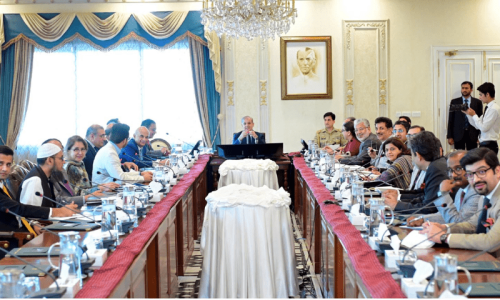VIENNA: A fourth round of nuclear talks between Iran and six world powers ended on Friday with both sides complaining that major gaps remained ahead of a July 20 deadline for a vaunted accord.
Iran’s chief nuclear negotiator Abbas Araqchi quoted on state television, reported “no tangible progress” at the talks in Vienna as he described the gaps as “too huge”.
However, he said Tehran remained “determined” to continue the talks in coming months.
Separately, a Western diplomat said “huge gaps” remain in the negotiations aimed at finding a lasting deal on limiting Tehran’s nuclear programme, and called on Iran to show more flexibility.
“Huge gaps remain, there is really more realism needed on the other side,” the diplomat said.
“We had expected a little more flexibility on their side.”
Unusually, no press conference was held and no statement issued after the three-day meetings between Iran and the so-called P5+1 powers — the five permanent members of the UN Security Council plus Germany — bolstering the impression that little had been achieved.
A US official had earlier said Washington was worried by a lack of progress in the talks, calling the discussions “slow and difficult”.
“Significant gaps remain between the two sides’ positions,” the senior US official in Vienna said on condition of anonymity.
“Iran still has to make some hard choices. We are concerned that progress is not being made, and that time is short,” the official said.
Michael Mann, spokesman for EU foreign policy chief and the six powers’ lead negotiator Catherine Ashton, however warned against reading too much into the lack of a joint statement or press conferences after the meetings.
“Nothing is agreed until everything is agreed. That’s why we don’t want to break things down and give a snapshot of where we are after every session,” he said.
“We have had three days of hard work. As we have said, the negotiations are complex and detailed,” he said.
“We are trying to formulate an agreement.”
Both the Iranian and US sides said the parties were having problems seeing eye to eye.
A source close to the Iranian delegation in Vienna was quoted by the IRNA news agency as saying that “the West has to abandon its excessive demands”.
“We had expected the Western side to become more realistic but this doesn’t appear to be the case yet,” the source added.
A next round of Iran talks was set for June with the EU still to fix the date, the official said.
Failure could have calamitous consequences, potentially sparking conflict (neither Israel nor Washington rules out military action) and creating a nuclear arms race in the Middle East.
Negotiators could in theory extend the July 20 deadline to win more time, but Presidents Barack Obama and Hassan Rouhani could struggle to keep sceptical and impatient US and Iranian hardliners at bay.
Published in Dawn, May 17th, 2014













































